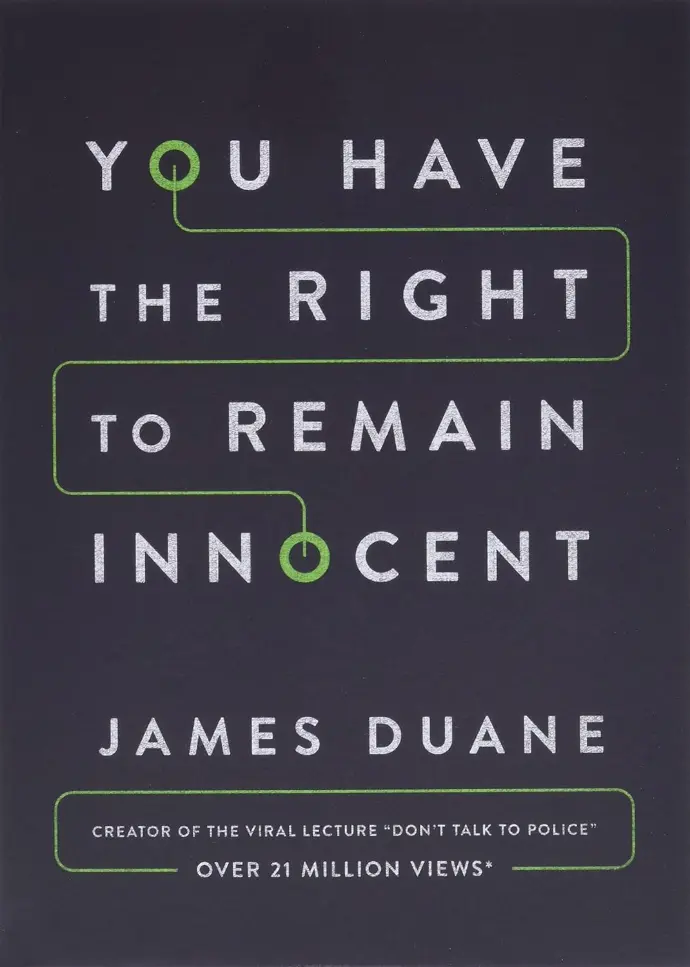In a world where we're often taught to trust law enforcement, it might come as a surprise to hear the advice: "Don't talk to police, EVER." This bold statement goes against what many of us have been raised to believe. However, as James Duane, a former defense attorney and professor of law, argues in his eye-opening book, You Have the Right to Remain Innocent, staying silent can often be the best course of action when encountering the police.
The Myth of Innocence
We've all heard the phrase "If you have nothing to hide, you have nothing to fear." This sentiment is deeply ingrained in society, perpetuating the idea that cooperating with law enforcement is the natural response of an innocent person. But what if this assumption is fundamentally flawed?
Duane dismantles this myth by illustrating how seemingly innocent statements can be twisted and used against you in a court of law. The reality is that even the most well-intentioned individuals can unintentionally incriminate themselves through casual conversation with the police.
The Fifth Amendment: Your Shield
At the core of Duane's argument is the Fifth Amendment of the United States Constitution, which protects individuals from self-incrimination. This means that you have the right to remain silent and the right to refuse to answer any questions posed by law enforcement.
Contrary to popular belief, exercising your Fifth Amendment rights does not imply guilt. It is a fundamental legal protection designed to prevent individuals from being coerced into making statements that could be used against them. As Duane succinctly puts it, "Talking to the police cannot help you."
The amendment as proposed by Congress in 1789:
No person shall be held to answer for a capital, or otherwise infamous crime, unless on a presentment or indictment of a Grand Jury, except in cases arising in the land or naval forces, or in the Militia, when in actual service in time of War or public danger; nor shall any person be subject for the same offence to be twice put in jeopardy of life or limb; nor shall be compelled in any criminal case to be a witness against himself, nor be deprived of life, liberty, or property, without due process of law; nor shall private property be taken for public use, without just compensation.
The Power of Silence
Duane's book is a wake-up call, reminding us of the power dynamics at play during police encounters. Even innocent individuals can find themselves in precarious situations if they unwittingly provide information that is later misconstrued.
One of the most compelling aspects of You Have the Right to Remain Innocent is its practical advice for navigating encounters with law enforcement. Duane provides clear and concise guidance on what to do if stopped by the police, emphasizing the importance of remaining calm and asserting your rights respectfully.

Protecting Yourself
So, what can you do to protect yourself in these situations? The answer, according to Duane, is simple: "Don't talk to police, EVER." This mantra may seem radical, but it is rooted in a deep understanding of the legal system and a desire to empower individuals to protect their rights.
Instead of engaging in conversation with the police, Duane advises calmly stating,
"I am invoking my Fifth Amendment right to remain silent. I would like to speak with my attorney."
This straightforward response can save you from inadvertently saying something that could be used against you later on.
Conclusion
You Have the Right to Remain Innocent is a thought-provoking exploration of our legal rights and the potential pitfalls of interacting with law enforcement. It challenges us to reconsider our assumptions about innocence and cooperation, offering a sobering reminder of the importance of safeguarding our rights.
In a society where trust in authority figures is often assumed, Duane's book serves as a crucial reminder that our rights must be protected, especially in moments of vulnerability. So the next time you find yourself in a situation with the police, remember the advice: "Don't talk to police, EVER." Your rights—and potentially your freedom—may depend on it.

For more insights on legal rights, check out James Duane's book, You Have the Right to Remain Innocent. And remember, when in doubt, stay silent.


Don't Talk to Police, EVER: Lessons from "You Have the Right to Remain Innocent"